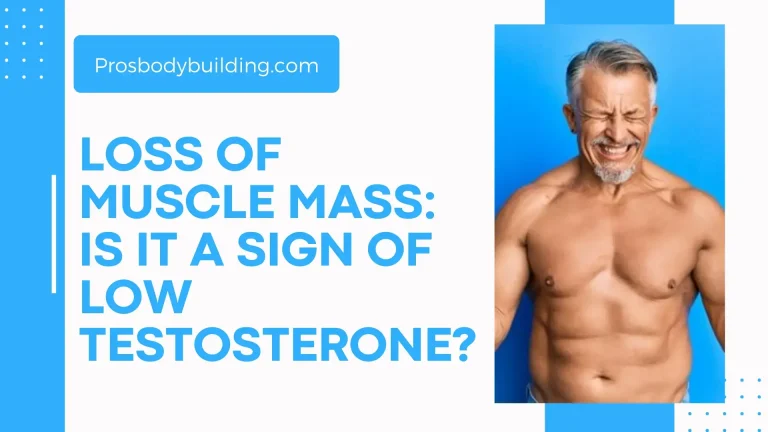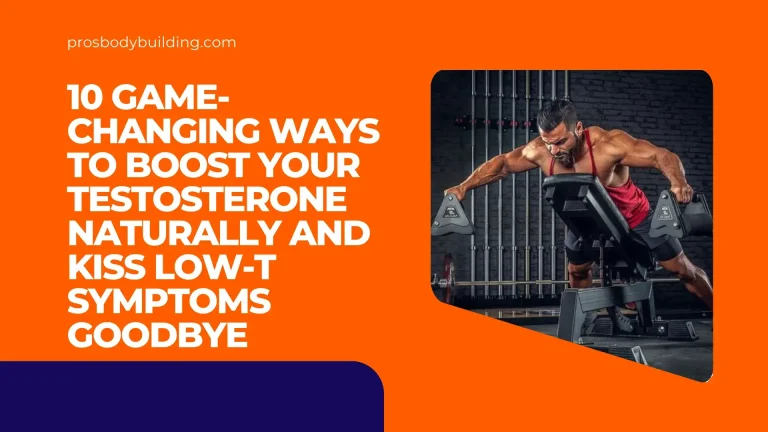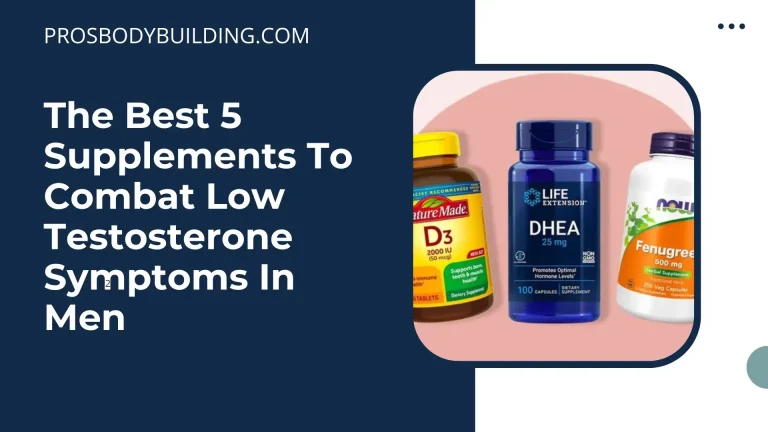Chronic Fatigue and Low Testosterone: Unveiling the Hidden Connection in 2024
Picture this: It’s 3 PM, and you’re slumped over your desk, fighting to keep your eyes open. Your third cup of coffee sits cold and forgotten beside you. Sound familiar? If you’re nodding off just reading this, stick with me – you might be dealing with more than just a case of the Monday blues.
Here’s a shocker that knocked my socks off when I first learned about it: up to 40% of men over 45 may have low testosterone levels. And get this – many of them are trudging through life with chronic fatigue, never realizing there might be a hormonal culprit behind their perpetual exhaustion.
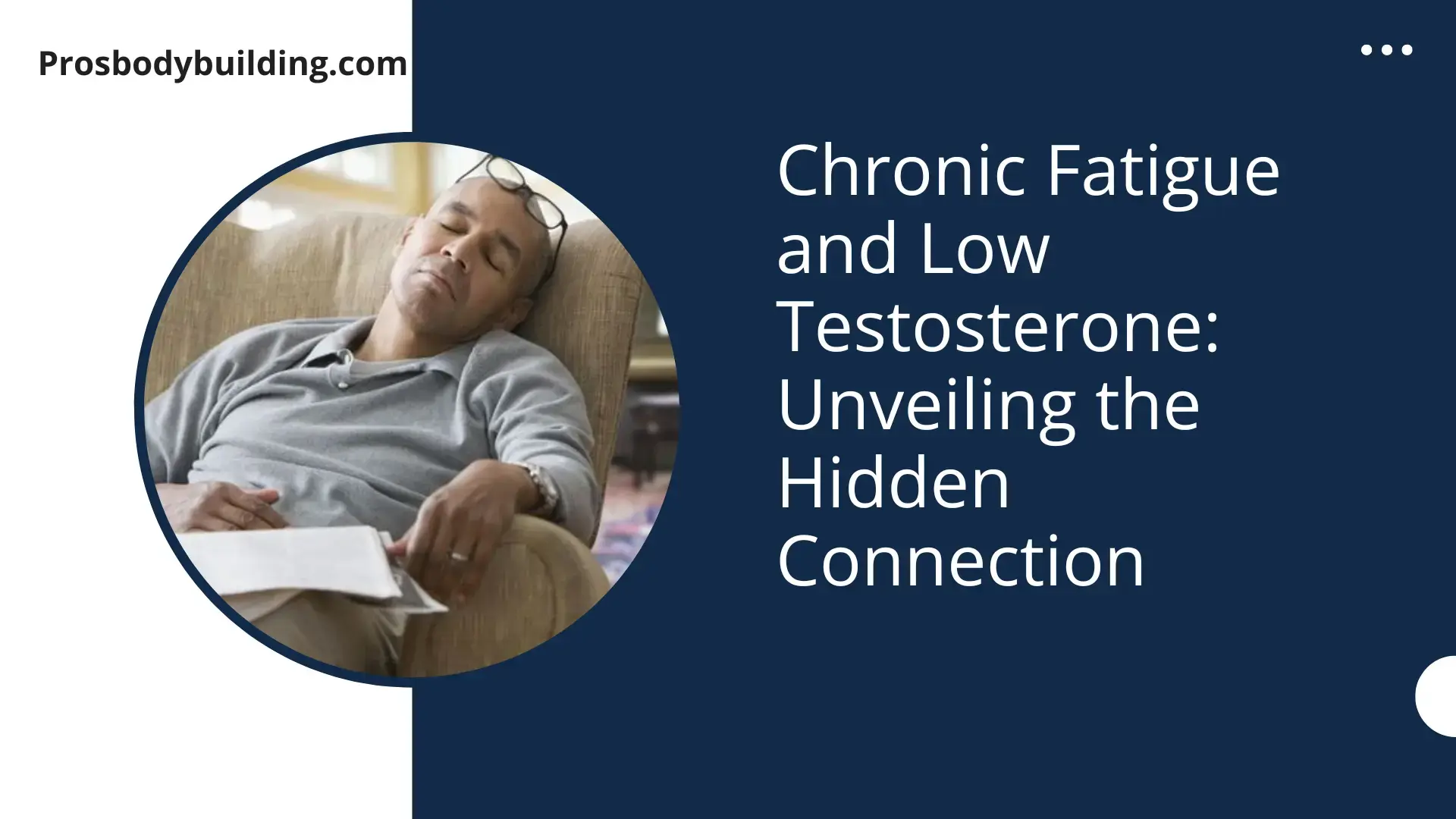
I remember chatting with my buddy Mike last week. He’s always been the life of the party, but lately, he’s been bailing on our weekly poker nights, claiming he’s “just too wiped out.” It got me thinking – could there be more to his story?
So, I dove headfirst into the rabbit hole of testosterone and fatigue, and boy, did I unearth some eye-opening stuff! Buckle up, folks – we’re about to embark on a journey through the fascinating (and sometimes puzzling) world of hormones, energy, and that all-too-familiar feeling of being utterly drained.
Trust me, by the time you finish reading this, you’ll have a whole new perspective on your fatigue. Who knows? This might just be the article that helps you reclaim your mojo!
Understanding Testosterone Fatigue: More Than Just Being Tired
Let’s kick things off with a little story. My cousin Jake, a 50-year-old fitness enthusiast, started complaining about feeling constantly wiped out. “I just thought I was getting old,” he told me with a shrug. But here’s the kicker – it wasn’t just normal aging. Jake was experiencing what experts call “testosterone fatigue.”
So, what exactly is testosterone fatigue? Well, it’s not your garden-variety tiredness that a good night’s sleep can fix. Nope, this is a whole different beast. Imagine your energy tank is running on fumes, and no matter how much you try to fill it up, it keeps leaking. That’s testosterone fatigue in a nutshell.
Here’s the deal:
- Testosterone isn’t just about muscles and libido – it’s your body’s natural energizer.
- When your T-levels take a nosedive, so does your get-up-and-go.
- Unlike normal tiredness, testosterone fatigue is persistent and often resistant to usual pick-me-ups.
Now, I know what you’re thinking – “But I get tired all the time! How do I know if it’s testosterone-related?” Great question! Let’s break it down:
- Normal tiredness usually has a clear cause (like a late night or a tough workout) and gets better with rest.
- Testosterone fatigue, on the other hand, is like that annoying house guest who overstays their welcome – it just won’t leave!
- You might also notice other symptoms like decreased motivation, mood swings, or even a dip in your, ahem, bedroom performance.
The Science Behind Low Testosterone and Chronic Fatigue
Alright, let’s put on our lab coats and dive into the nitty-gritty. Don’t worry – I promise to keep things interesting!
Remember high school biology? Yeah, me neither. But here’s a refresher: your body is like a complex factory, and hormones are the supervisors keeping everything running smoothly. Testosterone is like the energetic floor manager, making sure all the workers (your cells) are productive and efficient.
When testosterone levels drop, it’s like the floor manager decided to take an extended coffee break. Suddenly, things start to slow down:
- Your mitochondria (the powerhouses of your cells) get lazy and produce less energy.
- Your sleep patterns go haywire – ever tried to function on broken sleep? Not fun.
- Other hormones like cortisol (the stress hormone) start acting up, further draining your energy reserves.
I chatted with Dr. Sarah Johnson, an endocrinologist, who put it this way: “Think of testosterone as the conductor of a very complex orchestra. When the conductor’s off their game, the whole performance suffers.”
Symptoms: Is It Really Testosterone Fatigue?
Okay, so you’re tired. But is it really testosterone fatigue? Let’s play a little game of “Symptom Detective.”
If you’re experiencing any of these, your testosterone levels might be waving a red flag:
- Feeling exhausted even after a full night’s sleep (and yes, scrolling TikTok until 2 AM doesn’t count as sleep!)
- Struggling to concentrate – was I always this forgetful?
- Mood swings that rival a teenager’s (sorry, family)
- Muscle weakness – suddenly, opening that pickle jar is a Herculean task
- Low libido – Netflix and actually chill, anyone?
But here’s the tricky part – these symptoms can overlap with other conditions. Depression, thyroid issues, and even certain medications can cause similar problems. So, before you diagnose yourself via WebMD (we’ve all been there), it’s crucial to chat with a healthcare pro.
I remember when my friend Tom was convinced he had low T because he was always tired. Turns out, his new allergy meds were the real culprit. The moral of the story? Don’t jump to conclusions – get checked out!
Causes of Low Testosterone Leading to Chronic Fatigue
Now that we’ve covered the “what,” let’s tackle the “why.” Why does testosterone decide to ghost us as we age?
- Father Time: Aging is like that friend who always shows up uninvited to the party. As we get older, our bodies naturally produce less testosterone.
- Lifestyle Choices: Remember that “work hard, play hard” motto from college? Yeah, it might be catching up with you. Poor diet, lack of exercise, and excessive drinking can all put a damper on your T production.
- Medical Conditions: Some health issues are like party poopers for your hormones. Conditions like obesity, diabetes, and sleep apnea can all contribute to low T.
- Environmental Factors: Surprise! Your environment might be messing with your hormones. Things like pollution, certain plastics, and even stress can impact testosterone levels.
I had a wake-up call when my doctor told me my testosterone was on the low side. “But I’m only 35!” I protested. Turns out, my high-stress job and love for late-night pizza weren’t doing me any favors.
Diagnosing the Link: Tests and Assessments
So, you think you might be dealing with testosterone fatigue. What’s next? Time to play doctor! (But, you know, with an actual doctor.)
Here’s what you can expect:
- Blood Tests: This is the gold standard for measuring testosterone levels. Pro tip: testosterone levels fluctuate throughout the day, so your doc might want to do a morning test when levels are typically highest.
- Physical Exam: Your doctor might channel their inner Sherlock Holmes, looking for physical signs of low T like decreased muscle mass or increased body fat.
- Questionnaires: Prepare to bare your soul (or at least your symptoms) through detailed questionnaires. Don’t hold back – the more info, the better!
- Other Hormone Tests: Remember, your hormones are all interconnected. Your doc might check other hormones like thyroid or cortisol to get the full picture.
When I went through this process, I felt like I was on an episode of “House.” But trust me, it’s worth it to get to the bottom of your fatigue.
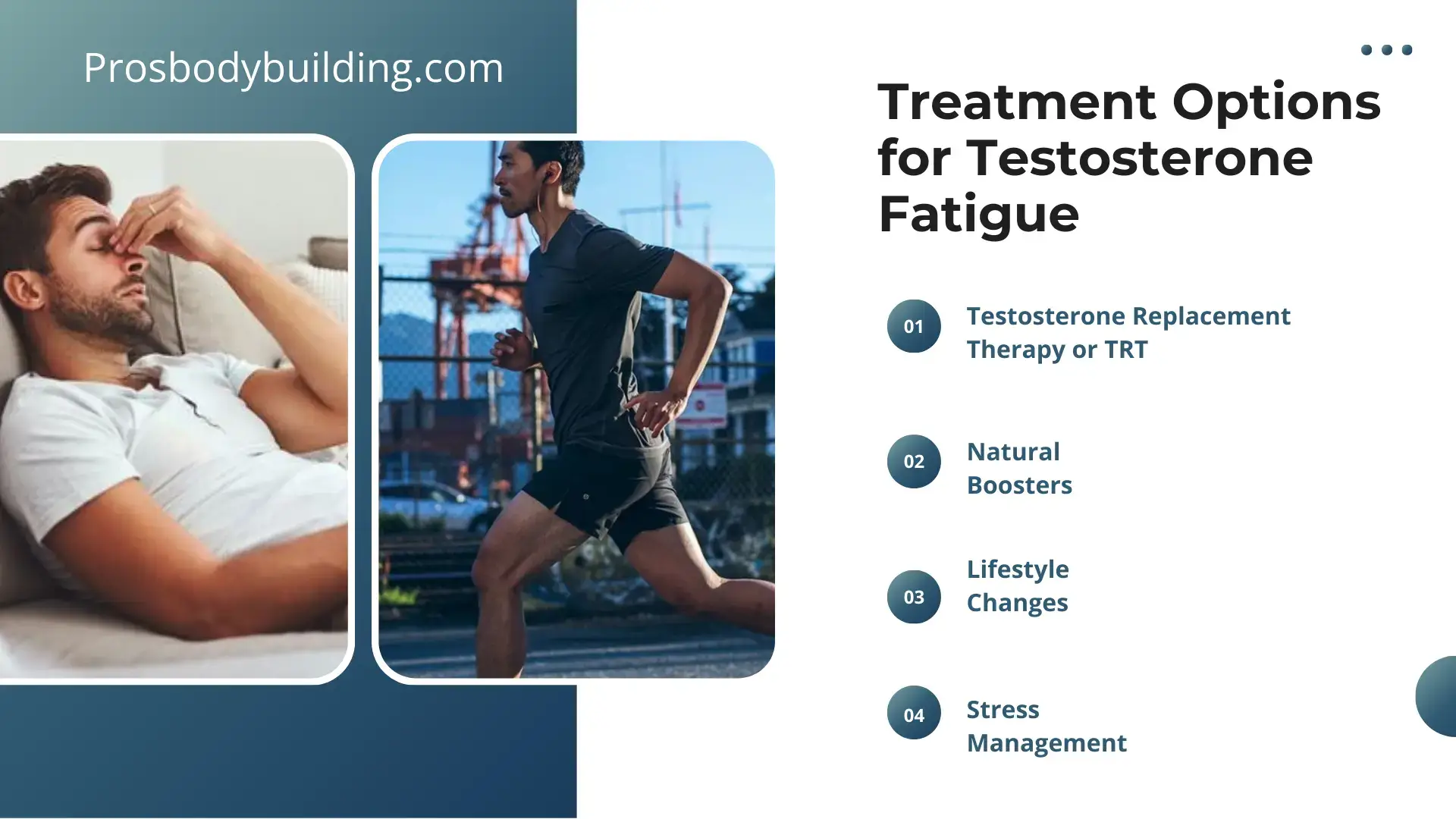
Treatment Options for Testosterone Fatigue in 2024
Alright, so you’ve been diagnosed with low T. Now what? Fear not – it’s not all doom and gloom. We’ve got options, people!
- Testosterone Replacement Therapy (TRT): This is the big guns. It involves supplementing your body’s testosterone through gels, patches, or injections. But heads up – it’s not a decision to be taken lightly. There are pros and cons to consider.
- Natural Boosters: Mother Nature’s got your back! Certain foods and supplements can give your T levels a little nudge. Think oysters, eggs, and leafy greens. Zinc and vitamin D supplements might also help.
- Lifestyle Changes: Sometimes, the best medicine is a good ol’ fashioned lifestyle overhaul. Regular exercise, especially strength training, can work wonders for your testosterone levels. And sorry, night owls – getting enough quality sleep is crucial.
- Stress Management: Chronic stress is like kryptonite for your testosterone. Find ways to chill out – meditation, yoga, or maybe taking up a low-stress hobby like underwater basket weaving (hey, whatever floats your boat!).
- Natural Testosterone Supplements – One of the best ways to boost testosterone naturally in your body is with the help of testosterone supplements like Testosil that combine various vitamins, minerals, amino acids and other natural ingredients to stimulate your body’s natural T production. Testosil is far better in composition than other competing brands on the market and can help you get amazing results without side effects. Check out my detailed Testosil review by clicking here.
My friend Jack swears by his morning gym sessions and evening meditation for keeping his energy up. “It’s like I’ve found the fountain of youth,” he told me, flexing his biceps (show-off).
Beyond Testosterone: Other Factors Contributing to Chronic Fatigue
Here’s the thing – while testosterone is a major player in the energy game, it’s not the only one on the field. Let’s zoom out and look at the bigger picture:
- Nutrition: You are what you eat, and if you’re eating junk, well… Focusing on a balanced diet with plenty of protein, healthy fats, and complex carbs can do wonders for your energy levels.
- Stress: Chronic stress is like a vampire, sucking the life out of you. Finding effective stress management techniques is crucial. I personally found that taking up painting helped me unwind – even if my “masterpieces” look like a toddler’s finger paintings.
- Sleep Quality: It’s not just about quantity, folks. Quality matters too. Creating a sleep-friendly environment and sticking to a consistent sleep schedule can make a world of difference.
- Other Health Conditions: Sometimes, fatigue can be a symptom of other underlying health issues. Don’t ignore persistent tiredness – it could be your body’s way of waving a red flag.
Conclusion:
Whew! We’ve been on quite a journey, haven’t we? From unraveling the mystery of testosterone fatigue to exploring treatment options, we’ve covered a lot of ground. If there’s one thing I hope you take away from this, it’s this: persistent fatigue isn’t something you should just accept as a part of life or aging.
Remember my buddy Mike from the beginning of this article? After reading about the symptoms, he decided to get checked out. Turns out, his testosterone levels were indeed on the low side. With some lifestyle changes and treatment, he’s back to being the life of our poker nights (and taking all my chips, but that’s another story).
The bottom line is this: if you’re feeling constantly drained, don’t brush it off. It could be your hormones waving a white flag, begging for attention. Take action – speak with a healthcare professional, get your levels checked, and explore your options.
Life’s too short to spend it feeling like a smartphone with 1% battery. With the right approach, you can recharge your batteries and get back to living life to the fullest. After all, isn’t it time you put the spring back in your step and the sparkle back in your eye?
So, what are you waiting for? Take that first step towards reclaiming your energy. Future you will thank you – probably with a vigorous high-five and a victory dance. Now go out there and show fatigue who’s boss!



